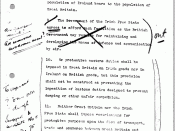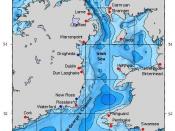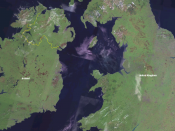"I'll sing this song for Ireland,cause I'm a Glasgow Irishman,I'd love to see old Ireland free, I know it's gonna be,So I sing for Ireland."(Glasgow Irish, Charlie and the Bhoys)These words sung by Charlie and the Bhoys a Scottish band illustrate the important Celtic culture in Britain. Much is known about the cultural division between the Irish Catholics and their Anglo-Protestant rulers on the Emerald Isle. The mass migrations from Ireland in the nineteenth century transferred this cultural and economic divide across the Irish Sea to the industrial cities of Victorian Britain. This paper will examine the reasons for the existence of an important Irish Catholic Culture on the British mainland, looking specifically at the Irish immigrant experience in nineteenth century Britain. The economic and societal plight of nineteenth century Irish migrants in Britain, along with efforts of the Catholic Church allowed for maintenance of a distinct Celtic culture amongst the Irish communities in Britain.
The Irish population was plagued with great demographic volatility in the nineteenth century. Between 1785 and 1841 the population of the small island nation doubled from 4 to 8 million. However, the growth was short lived and the census of 1851 shows that the population fell by approximately 20 per cent with one and a half million Irish emigrants flooding the ports of America, Canada, Australia, and Britain. The famine years started a wave of emigration that continued through to the end of the nineteenth century and beyond. By the census of 1901, the population of Ireland had fallen by approximately half leaving only 4.5 million residents on the Emerald Isle.
The official estimate of emigrants leaving Ireland between the years of 1852 and 1910 is 4 million. These numbers do not match the number of Irish-born counted in the 1911 British census. Cormac...


